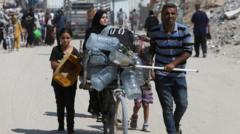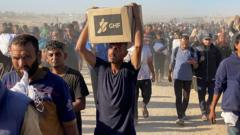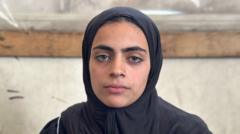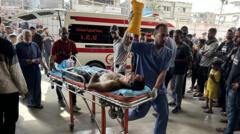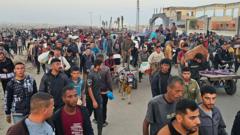The ongoing humanitarian crisis in Gaza has turned pregnancy and childbirth into anxiety-filled experiences for many women. With food shortages and disrupted medical care, expectant mothers are in fear for both their own health and that of their babies. Increasing incidents of malnutrition and inadequate pre-natal care, combined with the chaos of war, have led to tragic outcomes for many families.
"Life in the Balance: Expectant Mothers Face Crisis in Gaza Amid Ongoing Conflict"
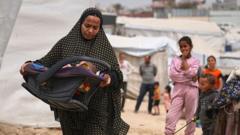
"Life in the Balance: Expectant Mothers Face Crisis in Gaza Amid Ongoing Conflict"
In Gaza, the perilous journey of pregnancy is marred by war, inadequate healthcare, and severe shortages, leaving mothers and newborns in dire situations.
In Gaza, the trauma of war seeps into every aspect of life, especially for expectant mothers. With the region under siege and basic medical services critically impaired, pregnancy is now fraught with peril. Women strive to bring new lives into a chaotic world marred by violence, but the harsh conditions significantly threaten their health and that of their unborn children.
A staggering one in ten newborns is reported to be underweight or premature, according to the UN, heightened by severe food shortages. Compounding these issues, there has been a noted uptick in miscarriages, stillbirths, and congenital anomalies, revealing the desperate situation facing mothers like Malak Brees, who shared her fears about the hazards of childbirth amid Israeli bombings. "I could have a premature birth at any time," she expressed, reflecting on the uncertainty that now accompanies pregnancy.
The blockade imposed by Israel has exacerbated these challenges, leading to a critical shortage of medical supplies, including those essential for childbirth. Stories emerge of women forced to give birth in makeshift shelters, with little to no access to medical assistance. Healthcare workers, such as nurse Sandra Adler Killen, have reported the grim realities of mothers being sent home mere hours after delivery, often with babies born underweight who traditionally would have required intensive care.
Hospital staff in Gaza, particularly at Nasser Hospital, are overwhelmed, still managing to provide care despite their facilities being under threat. Since the bombing of the European Hospital, many women find themselves relying on already strained resources, fully aware that their pregnancies and post-natal conditions are inadequately monitored.
The emotional toll is profound, as mothers contend with the anxiety of inadequate nutrition and the pressing worry about breastfeeding. They face the harsh reality of dwindling supplies of formula and nursing aids. Aya al-Skafi’s tragic narrative illustrates this struggle, as she lost her daughter Jenan to malnutrition compounded by the unavailability of critical nutrition resources, leaving her to plead desperately for assistance.
Organizations like the Gaza Infant Nutrition Alliance are attempting to provide support, focusing on the necessity of breastfeeding, even in dire situations. Compelling support from communities and outside organizations is crucial in a region where hope dwindles alongside life.
The heart-wrenching accounts are numerous and indicative of an escalating humanitarian disaster. Women are losing their babies to war-induced conditions and an overwhelmed healthcare system. The deaths of infants like Jomana Arafa's twin babies tragically underscore the impact of conflict on families.
As the world watches, the plight of pregnant women in Gaza transforms the notion of bringing life into the world into a sorrowful reality haunted by loss and fear, rather than hope and joy. The cycle of struggle continues, embodying the dire need for urgent humanitarian intervention and support.













